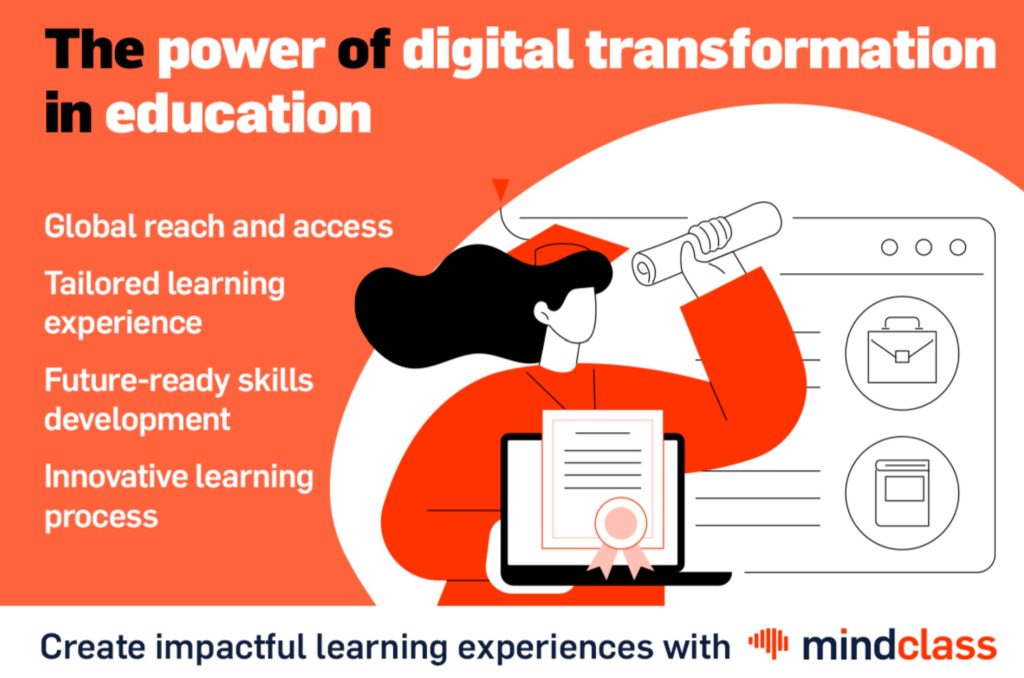- Ce înseamnă transformarea digitală în educație și de ce este importantă?
- De ce este esențială transformarea digitală în educație?
- Tehnologiile care vor modela cursurile viitorului
- Cum vor evolua metodele de predare în era digitală
- Cum să te pregătești pentru viitorul educației digitale
- Adoptă astăzi transformarea digitală în educație
Transformarea digitală în educație remodelează în mod fundamental modul în care învățăm, predăm și interacționăm în cadrul sistemelor educaționale. Pe măsură ce tehnologia continuă să evolueze, aceasta oferă cursanților instrumente pentru a face educația mai accesibilă, mai atractivă și mai personalizată.
Ce înseamnă transformarea digitală în educație și de ce este importantă?
Termenul de transformare digitală în educație se referă la integrarea instrumentelor și tehnologiilor digitale avansate în procesele de predare și învățare. Aceasta merge dincolo de digitalizarea metodelor tradiționale, cum ar fi scanarea suportului de curs sau utilizarea prezentărilor PowerPoint. În schimb, aceasta implică o regândire completă a modului în care educația este furnizată și experimentată.
De ce este esențială această transformare? Lumea devine din ce în ce mai digitală, iar educația trebuie să se adapteze pentru a pregăti cursanții pentru această realitate. Modelul clasei tradiționale, adesea limitat de bariere geografice și socioeconomice, poate fi acum completat – sau chiar înlocuit – de instrumente digitale care aduc educația la oricine, oriunde.
De ce este esențială transformarea digitală în educație?
O platformă digitală de învățare nu doar elimină barierele tradiționale, dar îmbunătățește și calitatea educației oferite. Acest model sprijină în special accesibilitatea și inovația:
- Accesibilitate extinsă: Platformele moderne permit accesul la educație de calitate pentru utilizatori din toate colțurile lumii.
- Personalizare sporită: Lecțiile sunt adaptate stilului de învățare al fiecărui utilizator.
- Dezvoltarea competențelor tehnologice: Utilizatorii își dezvoltă abilități digitale esențiale pentru pregătirea profesională.
Adoptând această transformare, organizațiile pot crea un mediu de învățare mai incluziv, mai echitabil și mai inovator.

Tehnologiile care vor modela cursurile viitorului
Mai multe tehnologii emergente se află în centrul transformării digitale în educație, fiecare fiind pe cale să revoluționeze modul în care sunt concepute și livrate cursurile:
Inteligența artificială (AI): AI permite deja învățarea personalizată prin adaptarea conținutului la ritmul și înțelegerea unui utilizator. Profesorii AI (de tip avatar virtual) pot oferi feedback în timp real, în timp ce algoritmii analizează datele pentru a identifica domeniile în care studenții au nevoie de sprijin suplimentar.
Realitatea virtuală (VR) și realitatea augmentată (AR):VR și AR creează experiențe de învățare imersive care fac conceptele abstracte tangibile. Imaginează-ți explorarea civilizațiilor antice într-o lume virtuală sau efectuarea unui experiment de chimie simulat. Aceste tehnologii îi implică pe utilizatori în moduri în care metodele tradiționale nu o pot face.
Tehnologia Blockchain: Blockchain asigură o păstrare sigură și transparentă a înregistrărilor pentru acreditările academice. Această tehnologie poate simplifica procese precum verificarea transcrierilor și emiterea certificatelor digitale, în beneficiul atât al utilizatorilor, cât și al organizațiilor.
Gamificare: Adăugarea de elemente de joc la învățare – cum ar fi puncte, niveluri și provocări – motivează utilizatorii și face învățarea distractivă. Cursurile gamificate stimulează competiția și implicarea, îmbunătățind ratele de retenție.
Analiza datelor: Perspectivele bazate pe date permit profesorilor să monitorizeze progresul, să prezică rezultatele și să adapteze strategiile pentru a răspunde eficient nevoilor elevilor.
Cum vor evolua metodele de predare în era digitală
Integrarea tehnologiei nu schimbă doar instrumentele; ea transformă metodologiile de predare. Iată cum se adaptează organizațiile:
- Blended learning: Îmbină cursurile tradiționale cu componentele digitale.
- Microlearning: Oferă module scurte și concentrate, ideale pentru cursanții cu agende încărcate.
- Învățare adaptivă: Lecțiile sunt personalizate pe baza datelor colectate de la cursanți.
- Proiecte colaborative: Promovează munca în echipă prin intermediul platformelor de învățare online.
Aceste metode în evoluție evidențiază importanța ca organizațiile nu doar să adopte noi instrumente, ci și să își regândească abordările pentru a promova experiențe de învățare semnificative.
Cum să te pregătești pentru viitorul educației digitale
Viitorul educației este incontestabil digital, iar pregătirea pentru acesta necesită acțiuni din partea formatorilor, instituțiilor, organizațiilor și cursanților deopotrivă. Iată cum să vă pregătiți:
- Investește într-o platformă modernă de învățare: Instituțiile trebuie să adopte tehnologii care facilitează experiențe educaționale inovatoare.
- Colaborează cu mindclass: Parteneriatele asigură accesul la cele mai noi soluții tehnologice.
Adoptă astăzi transformarea digitală în educație
Transformarea digitală în educație nu este un concept îndepărtat – se întâmplă acum. De la AI și VR la cursuri gamificate și învățare adaptivă, posibilitățile sunt nelimitate.
Ești pregătit să modelezi viitorul echipei tale prin educație? Explorează modul în care organizația ta poate valorifica tehnologia pentru a crea experiențe de învățare inovatoare și cu impact cu ajutorul platformei mindclass.




